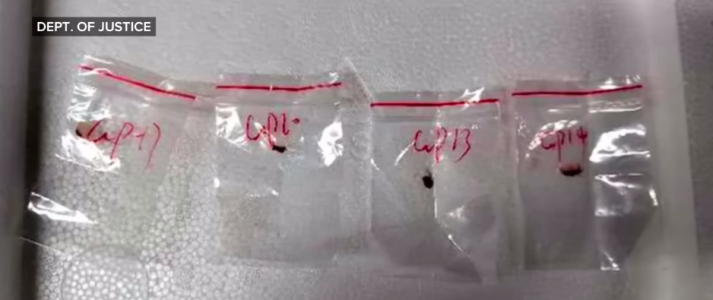Imported threat raises food and health fears as smuggling arrest shocks officials
- Replies 1
A concerning development has stirred fears in both food safety and national security circles.
Officials recently uncovered an unusual threat linked to an obscure scientific case.
While many Americans might not recognize the name of this rare organism, its reach could extend all the way from the lab to their kitchen tables.
Behind it all are a pair of foreign nationals, a university research lab, and a fungus with a long trail of destruction.
Two foreign nationals were arrested after allegedly smuggling a dangerous fungus into the US. According to the Department of Justice, the suspects face charges that include smuggling, conspiracy, visa fraud, and making false statements.
Authorities say the fungus involved—Fusarium graminearum—can infect wheat, maize, barley, and rice. The fungus causes Fusarium Head Blight (FHB), a disease that has already cost US agriculture close to $3 billion since the 1990s.
Officials confirmed the fungus not only harms crops but can cause liver damage, birth defects, and vomiting when consumed through contaminated food or animal feed. The US Department of Agriculture noted that infected grain becomes shriveled, discolored, and unsafe, describing the result as “tombstone” kernels.
Even after processing, toxins from the fungus can remain in products such as flour, cereal, and pasta.

The two individuals arrested were identified as a couple in their early 30s, Jian and Liu.
Prosecutors say one of them received research funding from the Chinese government and has alleged ties to the Chinese Communist Party. Authorities believe they intended to use a university laboratory for further work on the fungus.
The other individual is accused of lying to airport officials at Detroit Metropolitan Airport during the importation of the fungus. The complaint also accuses one suspect of having “loyalty to the Chinese Communist Party.” According to officials, their alleged actions pose grave risks to both agriculture and public safety.
US Attorney Jerome F. Gorgon Jr. described the case as one of the “gravest national security concerns.” He noted that the pair attempted to smuggle what has been described as a “potential agroterrorism weapon” into the US heartland.
Customs and Border Protection emphasized that these charges reflect their vital role in stopping threats to the US agricultural economy. The fungus, considered a high-risk biological agent, can significantly impact food production and safety.
Also read: Eating these freshwater invaders could come at a cost—here’s why officials are urging caution
The incident has renewed fears around agroterrorism. Experts say agroterrorism refers to the intentional introduction of pests or pathogens that damage food supply chains. Even a limited outbreak could disrupt food availability and drive up prices nationwide.
Because the food system in the US is tightly connected and highly productive, it also remains vulnerable to specific types of biological disruption. Federal officials warn that vigilance is essential at every entry point—from borders to research institutions.
The fungus involved includes strains that vary in aggressiveness. While only one species is confirmed in US wheat and barley fields, many others are known to cause damage globally.
The USDA highlights that contaminated grains often contain trichothecene and estrogenic mycotoxins. These compounds make crops unsafe not only for humans but also for livestock.
Once contaminated, these crops are unsuitable for food or animal feed.
Also read: Will retailers absorb Trump’s tariffs—or will shoppers pay? Treasury Secretary weighs in
Jian, the partner, is scheduled for a court appearance in Detroit. Investigations by the FBI and Customs and Border Protection are ongoing. The outcome may shape future policies involving biological imports, agricultural security, and visa regulations for academic researchers. Though the immediate risk to consumers is low, officials advise taking reasonable precautions.
Shoppers are encouraged to stick to trusted retailers, which typically follow strict food safety standards. The USDA and FDA regularly post food recalls and alerts, which can help consumers stay informed.
Buying local when possible may also reduce exposure to international contamination risks. Maintaining awareness and advocating for stronger safeguards remain key steps in food safety.
Read next: A batch of imported oysters has been recalled in the US due to health concerns

Have you ever had concerns about what’s really in your food? Do you think more should be done to screen biological materials entering the country? Have you heard about other threats like this before? Let us know what you think. Your voice helps keep The GrayVine community strong and informed.
Officials recently uncovered an unusual threat linked to an obscure scientific case.
While many Americans might not recognize the name of this rare organism, its reach could extend all the way from the lab to their kitchen tables.
Behind it all are a pair of foreign nationals, a university research lab, and a fungus with a long trail of destruction.
Two foreign nationals were arrested after allegedly smuggling a dangerous fungus into the US. According to the Department of Justice, the suspects face charges that include smuggling, conspiracy, visa fraud, and making false statements.
Authorities say the fungus involved—Fusarium graminearum—can infect wheat, maize, barley, and rice. The fungus causes Fusarium Head Blight (FHB), a disease that has already cost US agriculture close to $3 billion since the 1990s.
Officials confirmed the fungus not only harms crops but can cause liver damage, birth defects, and vomiting when consumed through contaminated food or animal feed. The US Department of Agriculture noted that infected grain becomes shriveled, discolored, and unsafe, describing the result as “tombstone” kernels.
Even after processing, toxins from the fungus can remain in products such as flour, cereal, and pasta.

Two foreign nationals were arrested after allegedly smuggling a dangerous fungus into the US. Image Source: ABC News / YouTube
The two individuals arrested were identified as a couple in their early 30s, Jian and Liu.
Prosecutors say one of them received research funding from the Chinese government and has alleged ties to the Chinese Communist Party. Authorities believe they intended to use a university laboratory for further work on the fungus.
The other individual is accused of lying to airport officials at Detroit Metropolitan Airport during the importation of the fungus. The complaint also accuses one suspect of having “loyalty to the Chinese Communist Party.” According to officials, their alleged actions pose grave risks to both agriculture and public safety.
US Attorney Jerome F. Gorgon Jr. described the case as one of the “gravest national security concerns.” He noted that the pair attempted to smuggle what has been described as a “potential agroterrorism weapon” into the US heartland.
Customs and Border Protection emphasized that these charges reflect their vital role in stopping threats to the US agricultural economy. The fungus, considered a high-risk biological agent, can significantly impact food production and safety.
Also read: Eating these freshwater invaders could come at a cost—here’s why officials are urging caution
The incident has renewed fears around agroterrorism. Experts say agroterrorism refers to the intentional introduction of pests or pathogens that damage food supply chains. Even a limited outbreak could disrupt food availability and drive up prices nationwide.
Because the food system in the US is tightly connected and highly productive, it also remains vulnerable to specific types of biological disruption. Federal officials warn that vigilance is essential at every entry point—from borders to research institutions.
The fungus involved includes strains that vary in aggressiveness. While only one species is confirmed in US wheat and barley fields, many others are known to cause damage globally.
The USDA highlights that contaminated grains often contain trichothecene and estrogenic mycotoxins. These compounds make crops unsafe not only for humans but also for livestock.
Once contaminated, these crops are unsuitable for food or animal feed.
Also read: Will retailers absorb Trump’s tariffs—or will shoppers pay? Treasury Secretary weighs in
Jian, the partner, is scheduled for a court appearance in Detroit. Investigations by the FBI and Customs and Border Protection are ongoing. The outcome may shape future policies involving biological imports, agricultural security, and visa regulations for academic researchers. Though the immediate risk to consumers is low, officials advise taking reasonable precautions.
Shoppers are encouraged to stick to trusted retailers, which typically follow strict food safety standards. The USDA and FDA regularly post food recalls and alerts, which can help consumers stay informed.
Buying local when possible may also reduce exposure to international contamination risks. Maintaining awareness and advocating for stronger safeguards remain key steps in food safety.
Read next: A batch of imported oysters has been recalled in the US due to health concerns
Key Takeaways
- Two individuals were arrested for smuggling Fusarium graminearum, a fungus harmful to crops and human health.
- The fungus has caused billions in US agricultural losses and can lead to liver damage, vomiting, and birth defects.
- Prosecutors say the suspects planned to use a university lab and received backing from a foreign government.
- The case raises alarms about agroterrorism, biosecurity, and the importance of border protections.






